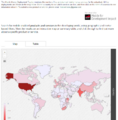Category:Micropayments
"Mobile phone penetration in developing countries is above 80%. Mobile payments were estimated to exceed US$235bn in 2013, $160bn of which were made in Africa. Using mobiles to perform small tasks and transfer money can help blaze paths out of poverty"...
http://www.cbsnews.com/news/future-of-money-kenya-m-pesa-60-minutes/
The majority of Kenyans lack a bank account. But more than half of Kenyans—about 16mn people—use M-PESA, a payments service that connects a network of 28,000 merchants and allows cash transfers via mobile phone without a bank intermediary...
The market for microwork—small, digital tasks that can’t be done by machines—in developing countries is estimated to rise from $4.5bn in 2010 to $20bn in 2015. Micro-employment is estimated to grow from 144,000 to 780,000 over the same period...
·················································································
Clay Shirkey: "The case against micropayments" that for online payments to work, they must incorporate offline solutions: aggregation, subscription and subsidy."
·················································································
M-Pesa and the Competition
http://techpresident.com/news/wegov/23803/google-bebapay-set-compete-m-pesa
Google just announced the launch of rebranded electronic payment system BebaPay in Kenya, home to the popular and successful mobile money system M-Pesa. With the BebaPay card, Google tackles the notoriously chaotic bus system in Kenya. The BebaPay card standardizes fares and provides riders with receipts, protecting them from unscrupulous conductors charging hiked up fares or not providing change. And it costs consumers next to nothing: the card is free and there are no transaction fees, although cell phone operators can charge to transfer money to the card. With all those perks, many are asking, “What’s the catch?”
Internet commentators are also divided on whether M-Pesa needs protection from big, bad Google, or if M-Pesa’s near-monopoly can use some healthy competition.
Google first “quietly” tested their beba card in May 2012. They could be obtained – for free – from beba agents. Users need a gmail account to activate and load a card with money. This year they teamed up with Equity Bank, the Kenyan bank with the largest customer base, and rebranded the card as BebaPay. The card uses Near Field Communication (NFC) technology, which means payment can take place offline even when there is no power or network connectivity.
·················································································
Bill Gates: how mobile banking can change the lives of the poor
http://www.theverge.com/2015/2/4/7966043/bill-gates-future-of-banking-and-mobile-money
·················································································
African entrepreneurs to beat the West at reinventing money for the mobile age
M Pesa programs like Paga, EcoCash, Splash Mobile Money, Tigo Cash, Airtel Money, Orange Money, and MTN Mobile Money have sprung up in several African countries.
·················································································
Read More:
https://www.worldremit.com/en/news/worldremit-and-mtn-agree-major-mobile-money-partnership
Mobile Wallets / Mobile Payments -- https://en.wikipedia.org/wiki/Mobile_payment
Pages in category "Micropayments"
The following 2 pages are in this category, out of 2 total.
Media in category "Micropayments"
The following 2 files are in this category, out of 2 total.
- Mobile Development Impact GSMA as of 2015.png 823 × 839; 269 KB
- Mobile subscriptions outnumber world population 2015.jpg 599 × 427; 37 KB

